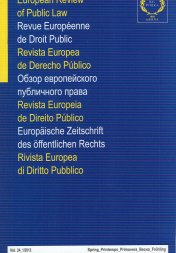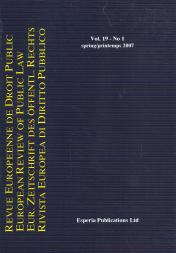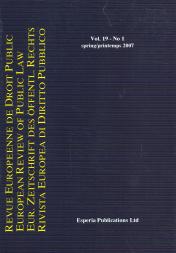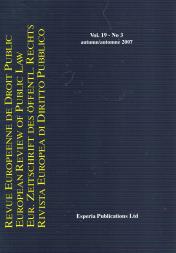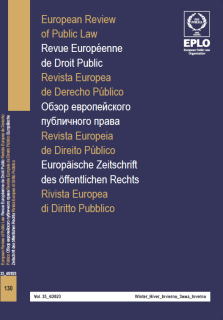
Administrative Law / Droit administratif
2022
Greece / Grèce
Maria-Evanthia Ioannou
Doctor of Law, Law School of Athens
The study outlines the development of administrative law during 2022 through important court decisions and significant laws. It starts with Law 4938/2022 which introduced the new institution of the telematic court, which with the provisions of the new law is reformulated as a telematic judicial office, so that it is terminologically clarified and framed institutionally with the required procedural guarantees that ensure the right to a fair trial with the use of new technologies. It continues with Law 4978/2022 by which the Public Revenue Collection Code was ratified by the Parliament, according to the procedure of Article 76 of the Constitution. The legislation, which had been processed by the Central Codification Committee, codified the provisions for the collection of public revenues, laid down in Legislative Decree 356/1974, on the Public Revenue Collection Code (KEDE). Furthermore, two important decisions are analyzed. First, the Council of State decision (A΄) 1500/2022 comes to be added to the “field” of those decisions of the Council of State which are distinguished by their consistent adherence, as this jurisdictional duty dictates, to the letter and spirit of the provisions of the Constitution and its corresponding implementing legislation. In particular, those provisions which are related to the defense of the value and free development of the personality as well as the consequent defense of the Fundamental Rights of Man, within the framework of the basic “coordinates” of our Democracy and our Culture (decision 770/2021 of the Council of State). The second one is the Council of State decision 625/2022 [A΄625-2022-3], the main contribution of which lies in the interpretation of Article 142 of the Administrative Procedure Code on no need to adjudicate in substantive disputes in the light of the right to judicial protection and the supra-legislative nature of its foundations.
L’étude donne un aperçu de l’évolution du droit administratif en 2022 à travers des décisionsjudiciaires importantes et des lois significatives. Elle commence avec la Loi 4938/2022 qui a introduit la nouvelle institution du tribunal télématique, qui avec les dispositions de la nouvelle loi a été reformulée comme un bureau judiciaire télématique, afin d’en clarifier la terminologie et l’encadrer institutionnnellement avec les garanties procédurales requises qui assurent le droit à un procès équitable avec l’utilisation des nouvelles technologies. Elle continue avec la Loi 4978/2022 par laquelle le Code sur la collecte de recettes publiques a été ratifiée par le Parlement, conformément à la procédure de l’article 76 de la Constitution. La législation, qui a été élaborée par le Comité central de codification, a codifié les dispositions sur la collecte des recettes publiques, du décret législatif 356/1974, sur le Code de la collecte des recettes publiques (KEDE). En outre, deux décisions importantes sont analysées. La première est la décision (A΄) 1500/2022 du Conseil d’État qui vient s’ajouter au “champ” de ces décisions du Conseil d’État qui se distinguent par leur adhésion constante, comme l’exige ce devoir juridictionnel, à la lettre et à l’esprit des dispositions de la Constitution et sa législation d’application correspondante. Notamment, ces dispositions relatives à la défense de la valeur et du libre développement de la personnalité ainsi que la défense conséquente des Droits fondamentaux de l’homme, dans le cadre des “coordonnées” fondamentales de notre Démocratie et de notre Culture (décision 770/2021 du Conseil d’État). La deuxième est la décision 625/2022 [A΄625-2022-3] du Conseil d’État dont la contribution principale réside dans l’interprétation de l’article 142 du Code de procédure administrative pour le prononcement du non-lieu à statuer substantiel à la lumière du droit à la protection juridictionnelle et du caractère supra-législatif de ses fondements.














